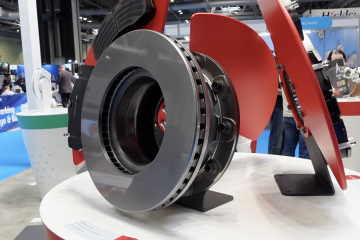Huddersfield MP Barry Sheerman has presented a ’10-minute bill’ to parliament, calling for an update to the MOT test for diesel cars, especially in the testing of Diesel Particulate Filters (DPFs).
It is rare for an MP to present such a bill, a way of arguing for a certain law to be made or changed. Therefore, Sheerman’s dedication to the issue of faulty or missing DPFs highlights not just his, but his constituents’ views on the problems they cause when it comes to air pollution.
Sheerman’s bill calls for the government to update the MOT test to include an efficiency test for DPF filters with an emission limit set at 250,000 particles per cm3. This, he says, would identify dangerous filters and ensure that they are taken off the road and fixed.
The MOT was changed in 2018, with a tougher emissions target for diesel vehicles, which it was hoped would help identify vehicles with missing DPFs. The emissions limits are determined by the car’s ‘plate value’ — an emission limit specified by the vehicle manufacturer — but there are some default limits for new cars, in case a plate value cannot be found.
Declining sales
Diesel vehicle sales are in steep decline at present, with the latest data from the Society of Motor Manufacturers and Traders (SMMT) showing that the market dropped by nearly 100,000 units in 2021, when mild-hybrid models are included. The European Automobile Manufacturers Association stated that for the first time ever, diesel fell out of the top two fuel types in 2021, with hybrids outselling the technology.
Part of the perception is the problem of nitrogen oxides, which the DPF is designed to catch. However, Sheerman pointed out that a faulty unit could see a single vehicle produce the same amount of pollution as a three lane, 360-mile-long traffic jam.
The MP stated that with high-tech testing equipment available at a reasonable cost, now is the time to update the MOT test. “It is already being done in the Netherlands, where a DPF efficiency test is being introduced that will identify faulty filters that emit a high level of dangerous particulates,” he said during his presentation. “In the UK we are moving in the right direction, but more must be done. In 2014 and 2018, regulations for DPFs have been updated as we have uncovered more about their impact on dangerous emissions. In 2022, it is time we act again.”
Pollution problem
The bill currently has 12 signatures, including former Labour leader Jeremy Corbyn. Posted on the parliament website as an ‘early day motion’, the bill does not need a specified number of backers before it is discussed further.
By attracting the signatures of other MPs, an EDM can be used to demonstrate the level of parliamentary support for a particular cause or point of view. In an average session, only six or seven EDMs reach over two hundred signatures. Around seventy or eighty get over one hundred signatures. The majority will attract only one or two signatures.
Sheerman hopes that by calling for more regulation of diesel emissions in the MOT, the path to lower air pollution in the UK will be made clearer.
“Cleaning up our countries air will require a long, focused, and well-resourced campaign with cooperation between central, local, and devolved governments,” he states. “Tackling air pollution is no easy fix but despite this, there are some quick wins to score that will have a positive impact on people’s health and wellbeing. My bill is one of those wins.”



